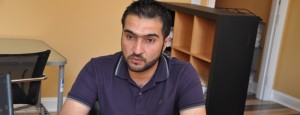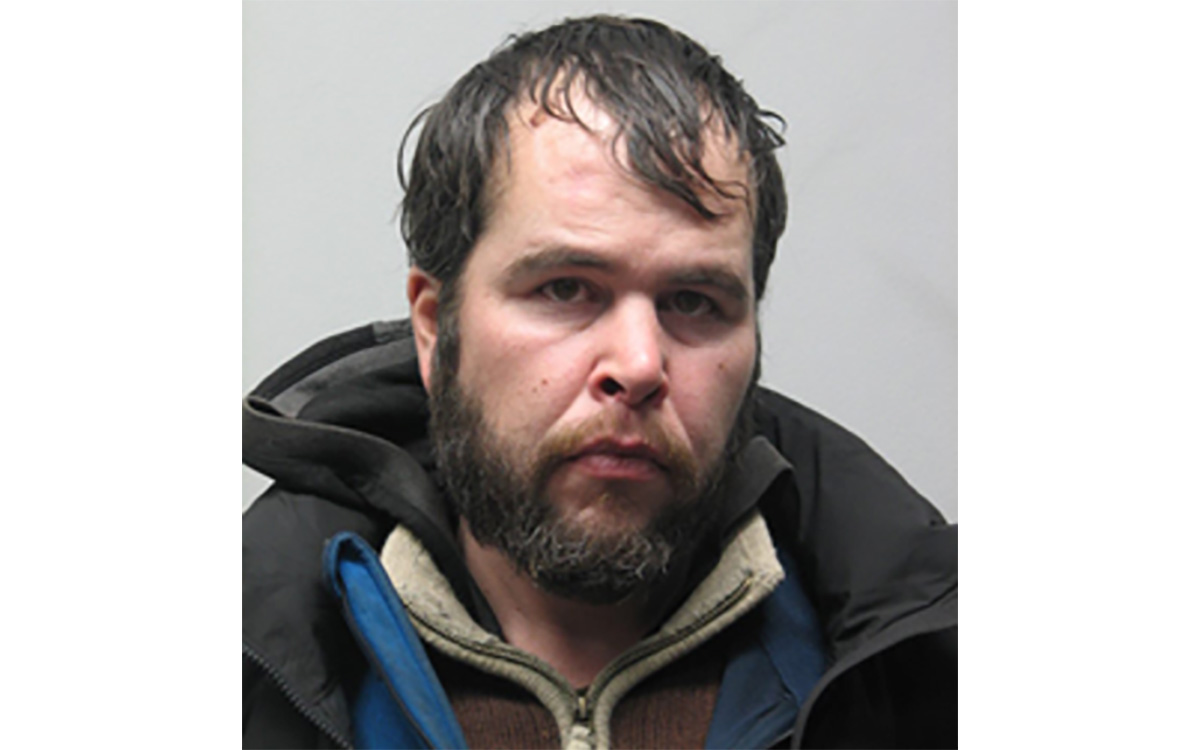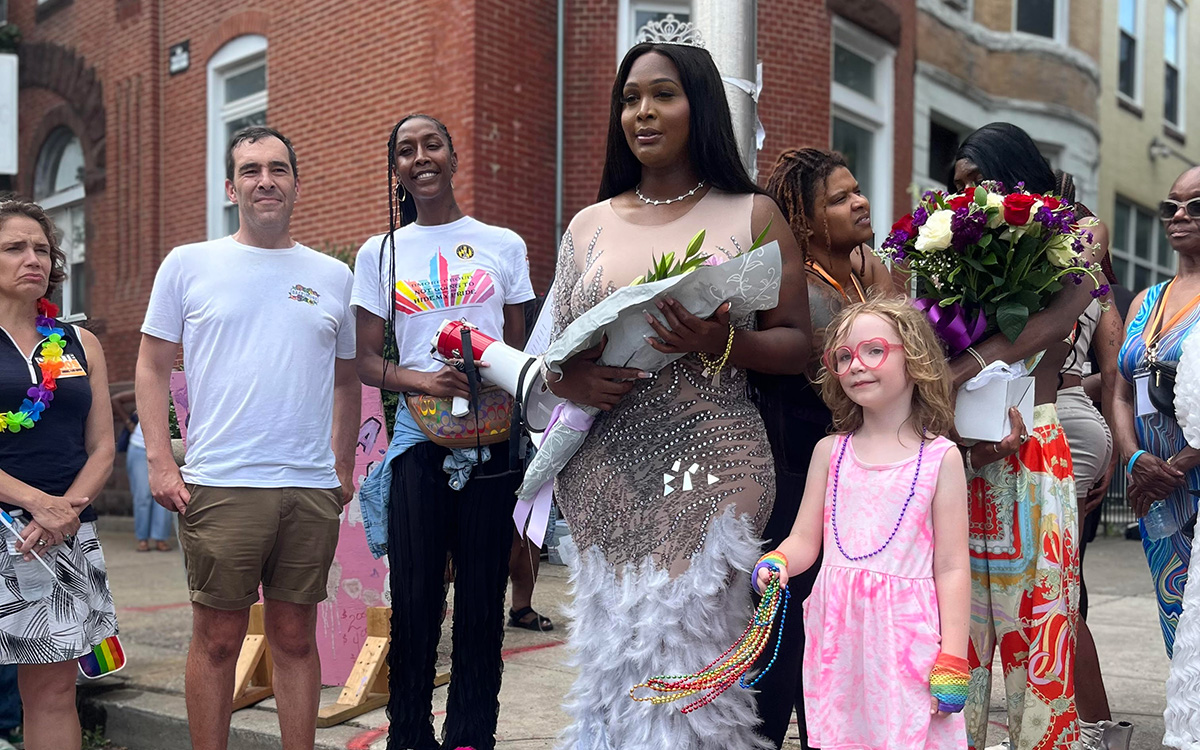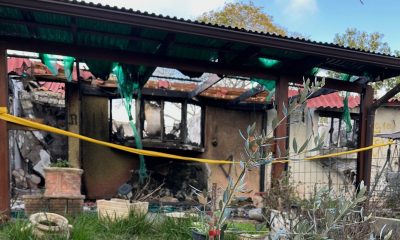Local
Casualties of war
Gay Iraqi, shot helping U.S., seeks fresh start in D.C. area

Firas Abdulmajeed, 33, a gay Iraqi refugee, has been in the U.S. for a month. A computer science expert, Abdulmajeed lost a leg to the Shiites while working as a translator for the U.S. Army in Baghdad. He’s now trying to find work in the Washington area. (Washington Blade photo by Michael Key)
Firas Abdulmajeed wants to make one thing clear up front: He’s not looking for a handout, just a job.
The 33-year-old gay Iraqi refugee, who fled to Alexandria, Va. a month ago with his 68-year-old mother after living six years in the United Arab Emirates, has faced an uphill battle most of his life. His home country was ravaged by war for most of his formative years; he lived under the violent regime of Saddam Hussein; and he suffered within a virulently anti-gay society that told him his same-sex desires were demonic.
Things have calmed for Abdulmajeed since he arrived in the U.S., but huge obstacles remain. While fluent in English and possessing the proper papers to work here, he suffered a life-changing gunshot wound in his native Iraq on July 21, 2003, that eventually required a below-the-knee amputation of his left leg.
The loss had an incalculably negative effect on Abdulmajeed’s life. He sometimes wishes the wound had been fatal.
He has a bachelor’s degree in computer science that he earned from Al Mansour University in his hometown of Baghdad, but Abdulmajeed says he’d be happy taking any job that doesn’t require him to stand and walk for any length of time. Infection and shoddy medical care after the injury — he’s certain his leg could have been saved had he received proper care — resulted in 17 operations, years of excruciating pain and a series of ill-fitting prosthetics that offer little help.
He met James Jorkasky, a gay Arlington resident, at a grocery store in Northern Virginia two weeks ago. Jorkasky, a lobbyist for medical research funding, could see Abdulmajeed was struggling to walk and started their conversation. He’s been using his contacts to help Abdulmajeed find a job, see an orthopedic surgeon and get a proper-fitting prosthetic leg.
“I’m really pushy and nosy, so I asked a lot of questions and found out a lot,” Jorkasky says. “I just thought maybe I could help.”
Abdulmajeed says knew he was gay around age 13. He was athletic and enjoyed swimming. He soon realized he was attracted to men he saw at the pool — and thought he was the only person in the world who felt this way. Confiding to the head of his mosque about his desires proved disastrous.
“He started shouting, ‘You are the devil,’ and kicked me out. I felt awful and embarrassed. So it was a hard time.”
The development came during Hussein-era Iraq, which natives regard as something of a mixed bag. Abdulmajeed says many Iraqis prefer it to the violence and chaos that has engulfed the country since the U.S. invasion. Even gay life was better then, he says.
“There was a gay community and a gay cruising area. In the Saddam time it was better. If you were gay and don’t talk about the government or Saddam, you were safe. Now both the Sunnis and Shiites are against that and want to show the Islamic world they are brave so they kill gay people.”
Abdulmajeed moved to Dubai after college, working various administrative jobs, but came back to Iraq just before the U.S. invasion in 2002. By March 2003, communication was down and Abdulmajeed, who lived with his parents again in Baghdad, visited a hotel to try to learn the whereabouts of relatives. Though Muslim, Abdulmajeed had attended a Catholic school and studied English. He also studied in Dubai and honed his speaking skills watching U.S. movies.
Abdulmajeed approached a U.S. Army officer and asked him in English if it was possible to make an international call at the hotel. In turn, the officer gave him an offer to work for the U.S. as a translator. Abdulmajeed became one of a team of Iraqi translators working in an Army contracting office in the Green Zone, Iraq’s international 3.8 square-mile zone in Baghdad.
While the work went well, it quickly became obvious to Abdulmajeed, a Sunni Muslim, that the Shiites did not approve of his work for the U.S. His new car was stolen, which he says may have had nothing to do with his work, but about three weeks later, a small bomb was thrown into his family’s house. Intimidating notes were sent to him. Still, he didn’t consider quitting.
“I think I was doing a good job and the officers in the contracting office, they were really nice people,” he says. “I wanted to help the Iraqis, and they always try to support Iraqi vendors, so I think it was [a] really good job, ethically, as I am Iraqi and also the payment was good.
“I didn’t understand the message — or maybe I was ignoring the message — as I [had] a chance to have [a] promotion to work with the USA embassy in Baghdad, as I was a hard worker.”
‘I’ll never forget his face’
The attack that claimed part of Abdulmajeed’s left leg happened quickly.
It was a Saturday in July 2003 and extremely hot. Abdulmajeed was waiting for a taxi to take him to his office in the Green Zone. He remembers thinking it would be a busy day, more like a Monday because the office was closed on Sunday, so there’d be extra work. On this day, he was to accompany a U.S. officer to a construction site.
He remembers thinking how hot it would likely be in the Humvee without air conditioning.
Without warning, a Shiite he’d never seen before came face to face with him carrying a gun. After reciting a Muslim creed (“I believe in one god, one prophet Mohammad…”), he pointed at Abdulmajeed’s left leg and shot him.
“I’ll never forget his face,” Abdulmajeed says. “He didn’t cover his face or try to hide. By the chance that a police [officer] was there it didn’t matter, because there was no government at that time. I didn’t feel it, actually. I just fell and my feet were moving kind of automatically. I was confused, then I start seeing blood over my jeans and I knew something was wrong. He was so close to me he could have easily shot me in the head and nobody would have stopped him.”
A neighbor helped Abdulmajeed get to a hospital by taxi, but staff there had few supplies and said they could do nothing for him. He was taken to another hospital where he stayed for six months. It was the beginning of a grueling ordeal that continues today.
Painkillers were in short supply. He was given one pill a day. He cut it in half and took half in the morning and half in the evening. Some of the 17 surgeries were performed without any anesthetic. His mother stayed with him around-the-clock at the hospital — a blessing and curse as he felt he had to mask his true emotions so she wouldn’t see him in agony.
“You act as if you don’t care because your parents are watching,” he says. “They want to know how you feel and you feel down but you cannot show it, the things in my heart, so I just smile and [was] joking.”
Aside from the physical pain, there were other scars. Just 26 years old at the time, Abdulmajeed realized he’d never again enjoy his hobbies of swimming and tennis. He also thought it would affect his desirability in the gay world.
“Maybe if I were straight it would be easier, but as a gay, it’s worse because it’s hard to be gay and beauty is so hard, and at that time I was thinking about my future, which I lost it already. I lost my job and every dream I had in my life.”
By July 2003, many doctors had fled Iraq or had been killed. A steel rod was inserted into Abdulmajeed’s leg, but he says that turned out to be a mistake as the wound should have been kept open. A gangrene-like infection set in and the muscle started dying. The infection caused a foul smell that scared away visitors. And though he’d had a boyfriend for about 18 months prior to the shooting, Abdulmajeed was dumped while he was in the hospital.
“He sent a message through a friend and said, ‘I can’t be with an amputee guy,’“ Abdulmajeed recalls.
Within a few weeks, he also lost his Army job, since being in the hospital prevented him from performing his duties.
Upon his release from the hospital, Abdulmajeed found a cheap prosthetic in Iraq, but it required a size 10 shoe and Abdulmajeed’s shoes were one size too small. He was able to walk with the aid of a stick and also used a wheelchair.
A relative arranged for him to come to the UAE in July 2004, but he faced an anti-handicap prejudice.
“It’s the Mediterranean mentality,” he says. “They don’t even call you by name. They just say, ‘Amputee.’ That really affected me a lot but I don’t have another choice. I couldn’t go back to Iraq and I was only allowed to stay in the UAE as long as I had a job.”
Abdulmajeed’s father, a retired civil engineer, was kidnapped in November 2006 after Abdulmajeed left for the UAE. The circumstances surrounding his disappearance remain unclear, but his mother was ordered to pay $30,000 to get him back. She followed the instructions to drive to a spot two hours from her house with the money. They were supposed to send her husband an hour after getting the money. She never saw him again.
Abdulmajeed says the tragedies were nearly too much to bear.
“We never even saw his body or know whatever happened to him. Surely he’s not still alive after all these years. So this old lady, she loses her husband and her son lost his leg for no reason. I didn’t do any mistake. If I was fighting or a soldier, that would be one thing, but I was a civilian. And my father, a Shiite kidnapped him because he was Sunni.
“It really affects your way of thinking, your dreams that you will get freedom. We don’t even need the freedom, just safety. And you can’t imagine the temperature. It’s 110 and there’s no electricity.”
Abdulmajeed eventually was able to have his mother join him in UAE in January 2007, but she was never the same.
“She lost it sometimes,” he says. “If I come in from work, I go inside the home and heard her speaking with my father. She imagines him there. So this is a problem.”
‘I don’t want charity’
Life stabilized for the two in UAE, but uncertainty loomed as their ability to remain there depended on Abdulmajeed staying employed, which he was able to do.
In 2007, he applied to a refugee program with the United Nations to come to the U.S. It was three years before his application was approved, but he and his mother, who has diabetes, high blood pressure and a heart condition, were able to come to the U.S. last month.
The two have little between them. He has a permanent Visa for refugees and a work permit, a few pieces of furniture, eight months of health insurance and food stamps.
“I don’t want charity or a handout,” Abdulmajeed says emphatically. “I just want a desk job, even data entry. Nothing fancy, just [enough] to cover expenses and to live here.
“About this point: I’m not looking for charity or donation. If someone wants to help, I need the jobs. Not because they’re sorry I lost my leg or am an amputee, but because he feels I desire a chance to prove myself. Only that. The day that I feel I can’t offer the life here, that’s the day I should go back to Iraq or wherever, but I don’t want charity.”
Jorkasky says he’s been amazed at his friend’s drive.
“I’ve never seen such a quick study on anything,” he says. “He soaks up everything I give him. I think somebody would get themselves and excellent, smart, dedicated worker.”
Jorkasky hopes the local LGBT community will help Abdulmajeed get the aid he needs.
Abdulmajeed’s new life is modest by American standards. He and his mother love the country and have been amazed by what they say are friendly, smiling people. He enjoys simple freedoms like visiting a garden near the apartment building where he lives. He’s been to no gay clubs since arriving. Jorkasky is his only gay friend. He knows one other Iraqi here.
“Sometimes I just sit there in the garden and I have this feeling how great it is do to anything or talking about anything gay or whatever in public,” he says. “I don’t have this feeling before, so this kind of freedom, it’s a great feeling everybody wants since childhood.
“I think there are a lot of Americans who may not agree with the war or the invasion of Iraq, but whatever your politics are, what gets lost in the equation a lot of times are the real casualties,” Jorkasky says. “I think everybody in the D.C. gay community should just take a step back and look at their lives and realize what they have compared to the incredible struggle that Firas has had. One of our brothers is suffering right now and needs our help.”
Job leads can be sent to Abdulmajaeed at [email protected] or Jorkasky at [email protected].
Virginia
Man went on ‘homophobic rant’ inside Va. pub that displayed Pride flags
Suspect arrested on charges of public intoxication, assaulting police officer

The Hawk & Griffin British Pub located in Vienna, Va., posted a message on Facebook last week saying a man was arrested after going on a “homophobic rant” inside the pub on June 28 when he saw that LGBTQ Pride flags were displayed at the pub for Pride month.
“Last night we had an incident here at the pub when a man came off the street to accost patrons in our beer garden because of our flags displayed for pride month,” the Hawk & Griffin Facebook posting says. “He then spit on our windows and came inside to confront our staff and patrons with homophobic rants,” the posting continues.
“Our manager and staff handled the situation very professionally and police were called to investigate and later arrested a man a couple of blocks away,” the message says. “We want to thank the Vienna Police Department for their quick response. We are and will continue to be community focused and we will never stop working to create and maintain a place of inclusion and tolerance,” the statement concludes.
Vienna police charged Justin Wayne Hendricks, of no known address, with misdemeanor counts of being “drunk in public” and providing false identification to a police officer and with a felony count of assault on a police officer. A police spokesperson said Hendricks was also found to be in violation of an outstanding arrest warrant from Alexandria, Va., related to a prior charge of failing to register as a sex offender.
The spokesperson, Juan Vazquez, said Hendricks is currently being held without bond at the Fairfax County Adult Detention Center. Online records for the Fairfax County General District Court show that Hendricks is scheduled to appear at a preliminary hearing on Oct. 9.
“On Friday, June 28, around 9:28 p.m. the Vienna Police Department responded to reports of an intoxicated individual threatening customers of the Hawk & Griffin,” a Vienna police statement says. “Upon the arrival of the officers the individual had already left the premises but was promptly located at an address nearby,” according to the statement.
The statement adds that Hendricks was subsequently charged with being drunk in public, providing false information about his identity to police, and assault on a police officer along with being served with the outstanding warrant related to the prior charge in Alexandria of failing to register as a sex offender.
Details of the prior sex offender charge couldn’t immediately be obtained from online court records. However, the online records show that Hendricks has at least a dozen or more prior arrests between 2014 and 2023 on charges including public intoxication, trespassing, and failing to register as a sex offender.
Police spokesperson Vazquez said it would be up to prosecutors with the office of the Fairfax County Commonwealth’s Attorney to determine if a subsequent hate crime related charge would be filed in the case.
Virginia
Parades, community events held to mark Pride Month in Va.
Upwards of 30,000 people attended PrideFest in Norfolk on June 22

Activists across Virginia last month held a series of events to mark Pride Month.
Hampton Roads Pride, a volunteer-run organization founded in 1997, held 37 different Pride events throughout the region in June.
Their biggest event, PrideFest, which is part of their larger three day event, Pride Weekend, celebrated its 36th anniversary on June 22. Pride Weekend took place from June 21-23 and began with a block party at NorVa in Norfolk.
PrideFest took place at Town Point Park, and an estimated 30,000 people attended. More than 70 venders participated, while Todrick Hall and Mariah Counts are among those who performed.
Another PrideFest event with a DJ in the afternoon and live music at night took place in Virginia Beach on June 23. Congressman Bobby Scott and U.S. Sen. Tim Kaine (D-Va.) are among those who attended Pride events in Suffolk on June 30.
Norfolk Mayor Kenneth Alexander, along with members of the Norfolk and Virginia Beach City Councils, also attended the Pride events in their respective cities. Jamar Walker, the first openly gay federal judge in Virginia, also took part.
“You know people all throughout Pride Month, at all of our various events, tell me all kinds of stories about their own experiences and the past of this community … and some of our older folks especially, remember when we couldn’t have this,” Hampton Roads Pride President Jeff Ryder told the Washington Blade on Monday during a telephone interview.
“It was a great year,” he added. “It was a big achievement for us to have unique celebrations in each of our seven communities. Each of these cities is so different from one another, but to be able to create a Pride celebration that’s unique in each of those places was really great, and I think really well received by folks who may not have felt represented previously. We’re always trying to do better, to embrace every aspect of our community, and take a big step forward there this year.”
State Dels. Adele McClure (D-Arlington County) and Alfonso Lopez (D-Arlington County) are among those who spoke at Arlington Pride that took place at Long Bridge Park on June 29. The Fredericksburg Pride march and festival took place the same day at Riverfront Park in Fredericksburg.
Republican Virginia Gov. Glenn Youngkin on June 10 hosted a Pride Month reception in Richmond.
Youngkin in previous years has hosted Pride Month receptions, even though Equality Virginia and other advocacy groups have criticized him for supporting anti-LGBTQ bills.
The Republican governor in March signed a bill that codified marriage equality in Virginia. Youngkin last month vetoed a measure that would have expanded the definition of bullying in the state.
Baltimore
Baltimore street named in honor of trans activist
Iya Dammons is founder of support groups Safe Haven in Baltimore, D.C.

Baltimore city officials and LGBTQ activists participated in a ceremony on June 29 officially dedicating the renaming of a street in honor of transgender woman Iya Dammons, who founded and serves as executive director of the LGBTQ services organization Maryland Safe Haven.
A section of Baltimore’s 21st Street at the intersection of North Charles Street, where the Maryland Safe Haven offices are located, has been renamed Iya Dammons Way.
The ceremony took place six years after Dammons founded Maryland Safe Haven in 2018 and one year after she launched a Safe Haven operation in D.C.in 2023 located at 331 H St., N.E.
A statement on its website says Safe Haven provides a wide range of supportive services for LGBTQ people in need, with a special outreach to Black trans women “navigating survival mode” living.
“Through compassionate harm reduction and upward mobility services, advocacy support, and community engagement, we foster a respectful, non-judgmental environment that empowers individual agency,” the statement says. “Our programs encompass community outreach, a drop-in center providing HIV testing, harm reduction, PrEP, medical linkage, case management, and assistance in accessing housing services,” it says.
Among those participating in the street renaming ceremony were Baltimore City Council member Zeke Cohen, interim director of Baltimore Mayor Brandon Scott’s Office of LGBTQ Affairs Alexis Blackmon, and Dominique Morgan, an official with the national foundation Borealis Philanthropy, which provides financial support for transgender supportive nonprofit organizations, including Safe Haven.
“This is a significant achievement and historic moment for our city,” a statement by Maryland Safe Haven announcing the ceremony says. “Iya Dammons has been a tireless advocate for transgender rights and has worked tirelessly to provide safe spaces and resources for transgender individuals in our city,” it says. “This honor is well-deserved, and we are thrilled to see her contributions recognized in such a meaningful way.”
-

 Canada2 days ago
Canada2 days agoToronto Pride parade cancelled after pro-Palestinian protesters disrupt it
-

 Theater5 days ago
Theater5 days agoStephen Mark Lukas makes sublime turn in ‘Funny Girl’
-

 Baltimore4 days ago
Baltimore4 days agoDespite record crowds, Baltimore Pride’s LGBTQ critics say organizers dropped the ball
-

 Sports4 days ago
Sports4 days agoHaters troll official Olympics Instagram for celebrating gay athlete and boyfriend










